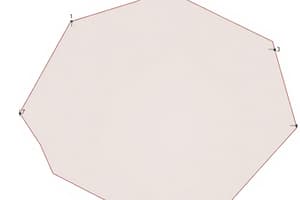Podcast
Questions and Answers
What is the formula for the area of a rectangle?
What is the formula for the area of a rectangle?
- Area = Length + Width
- Area = Length × Width (correct)
- Area = Width × Height
- Area = Length × Height
What is the formula for the area of a triangle?
What is the formula for the area of a triangle?
- Area = Base × Height
- Area = (Base + Height) / 2
- Area = Base + Height
- Area = (Base × Height) / 2 (correct)
What is the formula for the area of a circle?
What is the formula for the area of a circle?
- Area = 2 × π × Radius
- Area = π × Radius² (correct)
- Area = π × Radius
- Area = π × Radius³
What is the formula for the area of a trapezoid?
What is the formula for the area of a trapezoid?
Which of the following is not discussed in the article as a component of composite figures?
Which of the following is not discussed in the article as a component of composite figures?
What is the formula for calculating the area of a trapezoid?
What is the formula for calculating the area of a trapezoid?
How do you calculate the area of a regular hexagon?
How do you calculate the area of a regular hexagon?
If a trapezoid has bases of 7 units and 9 units and a height of 4 units, what is its area?
If a trapezoid has bases of 7 units and 9 units and a height of 4 units, what is its area?
What is the formula for calculating the area of a polygon?
What is the formula for calculating the area of a polygon?
If a regular pentagon (5-sided polygon) has a perimeter of 25 units, what is its area?
If a regular pentagon (5-sided polygon) has a perimeter of 25 units, what is its area?
Flashcards are hidden until you start studying
Study Notes
Composite Figures: Understanding the Area of Rectangles, Triangles, Circles, Trapezoids, and Polygons
In mathematics, we often encounter composite figures, which are made up of multiple simple geometric shapes. Finding the area of such composite figures involves adding together the areas of the individual shapes. In this article, we will discuss the area of rectangles, triangles, circles, trapezoids, and polygons, as they are commonly found in composite figures.
Area of Rectangles
The area of a rectangle is calculated by multiplying its length and width. The formula for the area of a rectangle is:
Area = Length × Width
For example, if a rectangle has a length of 5 units and a width of 3 units, its area would be:
Area = 5 × 3 = 15 square units
Area of Triangles
The area of a triangle is calculated by multiplying its base and height, then dividing by 2. The formula for the area of a triangle is:
Area = (Base × Height) / 2
For example, if a triangle has a base of 4 units and a height of 6 units, its area would be:
Area = (4 × 6) / 2 = 12 square units
Area of Circles
The area of a circle is calculated by multiplying π (approximately 3.14159) by the square of the radius. The formula for the area of a circle is:
Area = π × Radius²
For example, if a circle has a radius of 3 units, its area would be:
Area = π × (3²) = 9π square units
Area of Trapezoids
The area of a trapezoid is calculated by adding the areas of its two parallel bases, then dividing by 2. The formula for the area of a trapezoid is:
Area = ((Base₁ + Base₂) / 2) × Height
For example, if a trapezoid has two parallel bases of 4 units and 6 units, and a height of 5 units, its area would be:
Area = ((4 + 6) / 2) × 5 = 20 × 5 = 100 square units
Area of Polygons
The area of a polygon is calculated by dividing its perimeter by a factor that depends on the number of sides. For example, the area of a regular hexagon (six-sided polygon) can be calculated using the formula:
Area = Perimeter × (1/6)
For example, if a regular hexagon has a perimeter of 18 units, its area would be:
Area = 18 × (1/6) = 3 square units
In conclusion, understanding the area of composite figures requires knowledge of the area formulas for rectangles, triangles, circles, trapezoids, and polygons. By applying these formulas, we can find the area of any composite figure composed of these simple shapes.
Studying That Suits You
Use AI to generate personalized quizzes and flashcards to suit your learning preferences.




